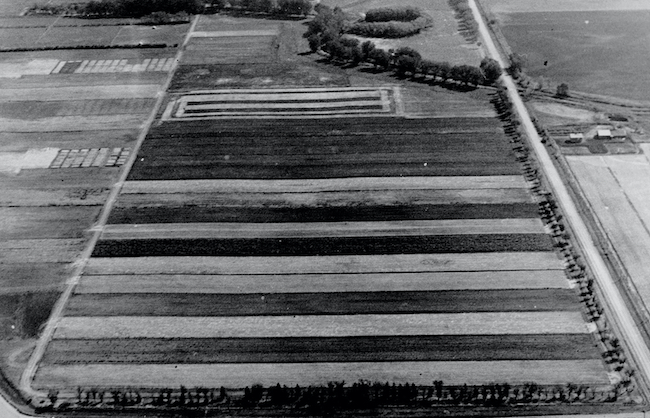
Features
Research
From the Editor: Honouring a rich legacy
April 8, 2021 By Stefanie Croley
 A historic aerial photo of the oldest and longest running agroecosystem experiments at AAFC's Lethbridge Research and Development Centre. Photo courtesy of the Agriculture and Agri-Food Canada archives.
A historic aerial photo of the oldest and longest running agroecosystem experiments at AAFC's Lethbridge Research and Development Centre. Photo courtesy of the Agriculture and Agri-Food Canada archives. One of the things I love most about my job is getting the opportunity to meet and chat with folks from all over the country, about all kinds of topics. As someone who didn’t come from an agriculture background, I value all of the tidbits and insights that come from even a five-minute chat. But the best conversations happen with those who are just as passionate about their work as they are knowledgeable about it, and I’d wager a bet that you won’t find a group of people more passionate than the agriculture research community. Their excitement is contagious.
If you’ve been a Top Crop Manager reader or follower for a long time, you’ll know our mandate is to focus on agronomy research. It’s been our niche for many years – long before I joined the brand in 2013 – and while we’ve dipped our toes into new things here and there, we’ve always gone back to what we know: transferring the most up-to-date agronomic information straight from the source to you, our readers. Frankly, without the incredible work done by researchers, professors, extension staff and the myriad people within the agricultural scientific community – and their willingness to share it with us – Top Crop Manager wouldn’t be the same.
New and up-and-coming projects have been always been our mandate, but sometimes the older the research, the more impactful it is. Take the story on page 30, for example. As Donna Fleury writes, agriculture ecosystem studies have long played an important role in current and emerging research with some of the experiments in Lethbridge, Alta., referenced in this story dating back more than 100 years. The longevity and impact of the trials is fascinating and proves agronomic research in Canada has a deep history.
In recent times – the past year, in particular – the research community has been affected in a number of ways. Like other industries, the pandemic has changed the way trials are carried out – in many cases, fieldwork has been postponed or cancelled altogether, forcing results to be delayed. The landscape of Canadian agricultural research has changed too, with funding cuts and shifting models. But as you’ll see in this issue and many others, in spite of the challenges, Canadian agronomy research continues to thrive, with ground-breaking developments in plant breeding and biotechnology, new ways to boost yields, combat weeds, pests and diseases and so much more.
In the age of “fake news” and misinformation, it’s more important than ever to learn from reliable sources. As you read through this issue, take some time to appreciate the work it takes for those credible sources to turn their questions into answers, helping you do your job better.